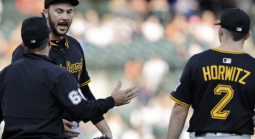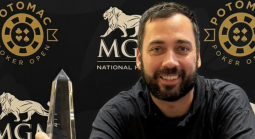Malta The New Hot Spot for European Fantasy Sports: Oulala.com Leads Pack

SLIEMA, Malta -- Fantasy football fever is boiling hot in Europe these days, with new fantasy leagues seemingly poppping up almost every day now.
Football in Europe, of course, is what Americans call soccer.
But no matter what one calls it, one thing is evidently clear--fantasy sports betting is taking off in Europe just the same way it's taking off in America.
And one of the latest Euro fantasy sports sites to cash in on that craze is Oulala (www.oulala.com), based just outside the historic capital city of Valletta in this tiny Mediterranean island nation.
Gambling 911 last week journeyed to Malta for a sit-down interview with Oulala's chief executive officer, Valery Bollier, a Frenchman, about, among other things, his company, how fantasy sports in Europe differs from fantasy sports in America and how he plans to take advantage of that difference.
Here is a transcript of that interview:
Gambling 911: How does your fantasy operation work and how is it different from the many other fantasy leagues out there? What states and countries are you legal in and how do you stop players who are not in those locations from joining?
Valery Bollier: Oulala is a fantasy football game based on European football. Customers every week create a team of 11 to 17 players, with football players from the five biggest European leagues, and then compete against other managers. The score of a virtual team is calculated by transforming real-live actions on the pitch into points, through a sophisticated statistical tool. All statistics come from real football players during their real professional football matches. The goal is to create the best performing team and therefore to accumulate the most points. Oulala was launched as a free game and its monetized version will be launched in August. Oulala is the only fantasy football game that is a true skill game and it is the only truly European game, as clients can create teams with players from the 98 football teams competing in England, France, Germany, Italy and Spain. Oulala is also the only game to offer a live substitution feature, allowing us to be a real-second screen game. Launching a fantasy football game in Europe is a very different challenge than launching it in the U.S. We have multiples languages and different levels of market maturity. Each country is different and there are different currencies. Even more importantly, there is a cultural gap in the data/sports relationship. When an American talks about LeBron James' last basketball game, he will give his stats sheet. If a European talks about Messi’s last football game, he will probably say he played amazingly well. In other words, Big Data is not yet part of our European sports culture. This explains why we ran our game for two years in its free version before launching the monetized version of Oulala in August. We had to adapt our game to the expectations of European customers, since simply duplicating the U.S. model is far from being enough.
G9: How much does it cost to join and what do you get for your money?
VB: The minimum fee to join a league will be one euro. The winner of the league will win the common pot minus our commission, which has a maximum of 10 per cent.
G9: Why is your operation legal and why isn't it considered gambling?
VB: Talking about the legal issues in Europe is not easy as each country has a different vision of what Internet gaming or "moneytainment" is, as well as what a skill vs. luck game is. Most countries allowing fantasy sports have already included fantasy in their traditional Internet gaming licenses. Some countries are not aware of fantasy yet and their legislator have therefore no opinion on that subject for the moment. We are currently working with the Maltese government to help them create the first skill game license purely dedicated to fantasy sports. We believe this is a critical issue in Europe, and a very different situation than in the U.S., as some Internet gaming operators might want to pretend, for marketing reasons, that they offer a game of skill when it is actually a game of luck.
G9: Why is it so important to differentiate a skill game from a luck game?
VB: Because the whole point of fantasy is to prove to your friends that you know sports better than them. Therefore, the results have to be as close as possible to reality. If you have an encyclopedic knowledge of football, you should reasonably expect to beat your friends who only have a social interest in football. Therefore, if the result of the game is random, your friends might crush you, which is purely unacceptable. If fantasy is not a skill game then it loses all of its purpose. To answer your question, fantasy is not considered to be gambling because it is a game based on your skills and not based on luck.
G9: How did you manage to create a real skill game?
VB: We worked for six months with a team of statisticians to build a mathematical matrix allowing our game's results to be as close as possible to reality. We then tested our scoring system for more than a year to prove that Oulala is a real skill game. We are constantly looking to improve it as this is the cornerstone of our game. Our scoring system includes 70 football statistics, compared to around 10 to 16 for our competitors. Each criteria is weighted based on the player's position--keeper, defender, midfielder and striker--to stick even more to the reality of a football game.
G9: How did you get into the fantasy sports business? Can you tell us about your personal background?
VB: While working in the Internet gaming sector, mainly as a marketing director, I realized that customers were increasingly seeking richer experiences than the one offered by luck games. Fantasy sports is a social skill game that perfectly answered that need. When I met Ben Carlotti, the co-founder and managing director of Oulala, he introduced me to the concept of fantasy sports. I quickly knew that this was exactly what I was looking for. We have been working on Oulala full-time for the past three years. I have now worked for over 10 years in the Internet gaming industry and before that, mainly in online marketing and media. I hold an EMBA from HEC business school and a Master of Management from Dauphine University, both in France.
G9: How old do you have to be to play at Oulala?
VB: Oulala is only accessible to adults 18 and over. As soon as the monetized version of our game is launched, we will ask for proof of identity, and an address, the first time someone wants to withdraw money from their account. It is a simple and efficient way to avoid having minors playing on Oulala.
G9: How are you preparing to compete against the commercially successful DraftKings and FanDuel? Both companies have attracted significant investment monies recently, so are you preparing to do the same?
VB: The U.S. domestic market will be, for the next couple of years, amazingly competitive. Therefore, we do not expect FanDuel or DraftKings to seriously invest in the European market in the very near future. We are currently working on our Series A funding round--a million and a half pounds--and will most probably start our Series B round, 10 to 12 months later. Therefore, yes, we could say that we are trying to follow their fast-growing path.
G9: What has been the growth rate of your business in the last year? What is the driving force behind that growth? Has the media coverage fantasy is getting translated into a boost for your own business? And how many paying customers do you have right now?
VB: We got out of our beta version only at the end of 2014. In just five months, we went from 7,000 beta testers to more than 16,000 customers and our growth curve is increasing very quickly. Most European prospects do not have a clue of what fantasy football is. We therefore have to evangelize and educate them. The best way to do so is through a trusted third party, which can be a journalist, as well as a large and well-known partner. Our recent growth is a direct result of this strategy. As mentioned earlier, Oulala is currently a free game and we will launch our monetized version in August of 2015.
G9: Can you compete with ESPN and Yahoo?
VB: We welcome any serious competitors that would like to enter the European fantasy football industry. This is key for the development of the market. The more competitors we have, the more visibility our new industry will gain. It will be a win-win situation for everyone.
G9: Would it make sense for a fantasy company like yours to team up with an online sportsbook partner, such as Bookmaker.eu or Sportsbook.ag out of Costa Rica, or one of the European books such as Paddy Power of Ireland or William Hill of the U.K.? Such a partnership would give you a ready-made customer base of sports-betting fanatics, so have any such companies approached you or vice-versa?
VB: It totally makes sense for us to seek partnerships with Internet gaming operators. This is the reason we will commercialize Oulala in white label for the BtoB market, right after launching the monetized version of Oulala in August. Internet gaming operators need to rapidly have access to this new market since, as always, when a new product arrives, like poker 15 years ago, the first movers are often the winners. Fantasy sports is the next big thing arriving in the European market. With Oulala, any operators willing to benefit from this new opportunity will have access to a plug-and-play solution in less than three weeks.
G9: Where are you based and why have you chosen that location? And are you considering branching out into other locations?
VB: We are based in Sliema, Malta. This was an easy decision for us. Malta is an English-speaking country, member of the European Union and only a few hours away from any major European city. Most importantly, Malta has the most efficient pro-business environment that I have ever seen. Launching a start-up is a very risky challenge and it is essential that your energy is not wasted on, for instance, administrative Kafkaesque issues. Over here, my mind is free to focus only on what matters the most for my company, which is priceless. Finally, on a personal note, Malta has many other assets. It is a very safe place, people are amazingly friendly and happy, and it is just a stress-free environment overall. And I am not even talking about the advantages of living in a country which has one of the best climates in the world. Branching out in other counties will obviously be a necessity but not in the very short term.
G9: Do you have many female players? What percentage of your customer base is female? Are there any significant differences in the way female customers play fantasy football as compared to male players, as far as strategy, tactics and expectations are concerned?
VB: In Europe, football has been, culturally, mostly followed by men. Slowly, more and more women are becoming football fans. Despite that tendency, more than 78 per cent of our clients are male. The main difference is that women have a tendency to select players based on their physical criteria. Apart from this anecdote, the European market is still too young to efficiently analyze sub-groups of players.
G9: How do you see the European fantasy market in a few years ?
VB: Europe is structurally a late adopter. But after a slow start, Europe usually catches up. I am therefore very optimistic on the potential of our market. Nonetheless, the future leaders will be the ones with a perfect knowledge of our complex market. The other key to success will be to find a way to transform a 100 per cent pure American concept and make it compatible with the European market's specificities. After analyzing our clients for the past two years, we at Oulala are confident that we have to ability and knowledge to do it.
By Tom Somach, Gambling911.com Staff Writer













